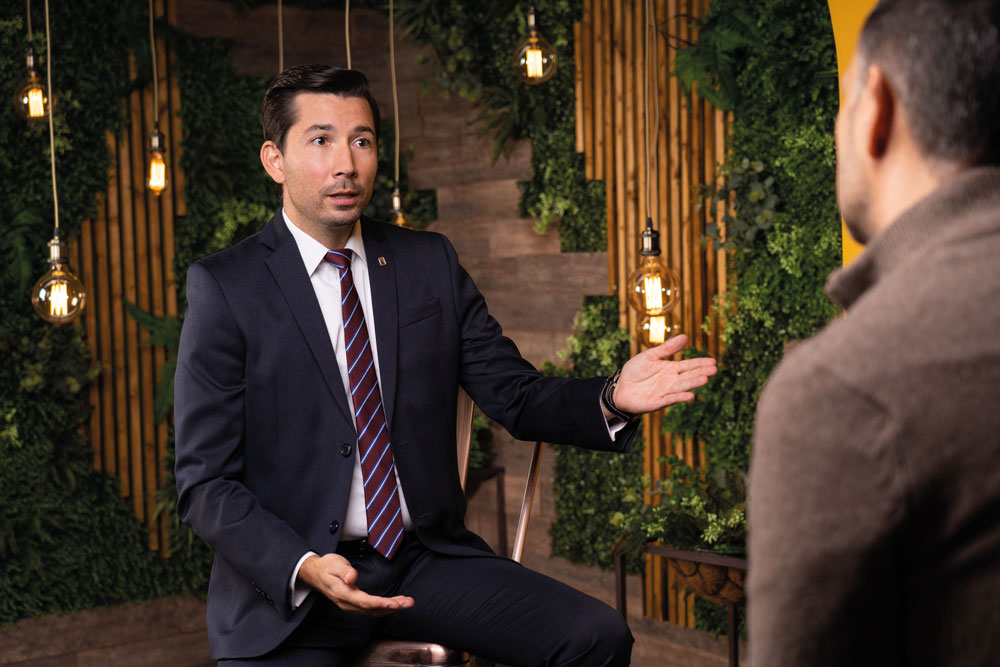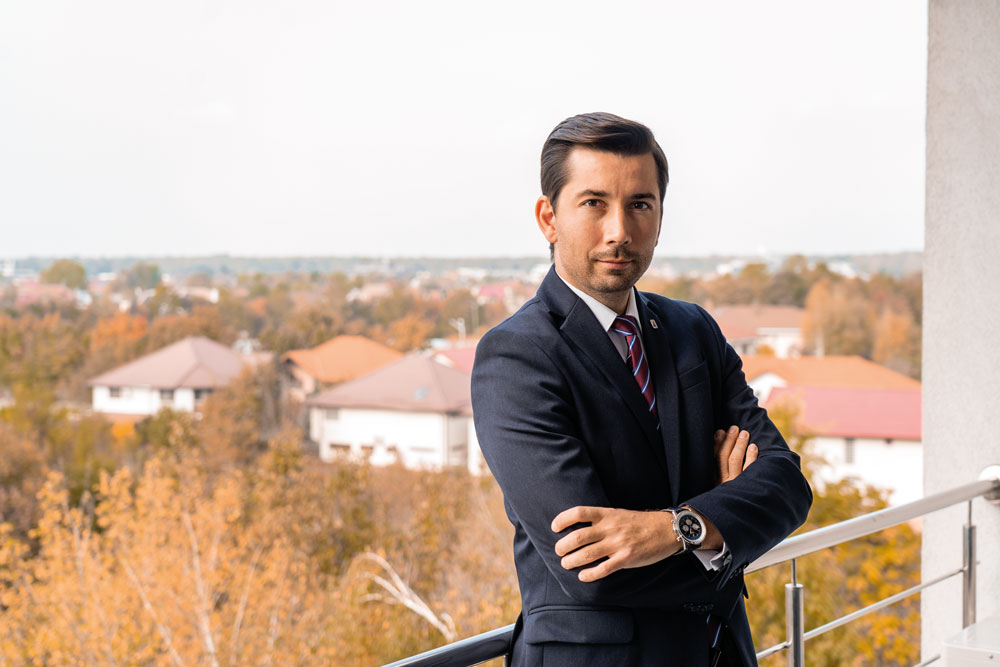Catalin Nita: Importance of Being Digital in Oil & Gas
We are talking to the Executive Director Catalin Nita about the role of the Oil and Gas Employers’ Federation (FPPG) in the industry, the importance of digitalization for the development of the sector, the prospects of the profile market, as well as about the challenges of the next period for the energy companies.
Recently, the Oil and Gas Employers’ Federation (FPPG) was consolidated, welcoming new members. Through consistent efforts, FPPG now brings together the main natural gas producers, which cover over 98% of national production, thus attesting to its representativeness for the energy sector.
Dear Mr. Nita, how was the Oil and Gas Employers’ Federation established? How many members does it bring together, what is its role and what are its objectives?
Catalin Nita: Our goal is to strengthen the partnership with public authorities and most of the decision-makers involved in the legislative process that impacts the oil and gas sector.
FPPG has both a tradition, over 25 years of existence, and legitimacy as it brings together over 12 relevant companies in the field, among which we mention the main producers of natural gas, operators of the national oil and natural gas transportation system, the main underground storage operator of natural gas.
Thus, acting as a forum for debate for our members, one of the most important missions of the federation is to support the relevant authorities in the field with expertise, whether we refer to analyzes, specialized studies or examples of best practices. In this collaborative manner, we appreciate that we can promote and facilitate a transparent dialogue between the business environment and the responsible authorities.
2020 was a complicated year for the national gas market. Romania has assumed a series of obligations to the European institutions, experts estimate that there are significant amounts of gas left in storage, there is a surplus of gas in the region, geopolitical resettlement are taking place in the region from the perspective of natural gas, elections are coming… How do you assess the current situation of the gas market in Romania and of the regional one?
Catalin Nita: The challenges for the oil and gas industry existed even before 2020.
The industrial sector had a downward trend since early 2018, and the pandemic thus aggravated the difficulties, industrial production falling by almost 40% in April this year.
In addition, the slow recovery in the coming quarters, both in 2020 and 2021, will continue to have an impact on fuel demand, with factories and industrial plants operating at lower levels.
Our estimates indicate that, in the long run, fuel consumption and overall purchasing behavior will change as the market structure is affected by this crisis.
Furthermore, the difficult economic environment prevents the continuation of drilling campaigns as originally planned, as well as other important projects, thus limiting or postponing the additional quantities of oil and gas to be produced in the future.
Also, in a broader context, if we refer to the international trade of fuels and gas, our expectations are that at least until 2022, we will face many challenges as the access to markets of Romanian producers will be extremely limited.

What decisive factors can influence this situation and what are the ways to recover?
Catalin Nita: Energy plays a key role in everyday life, and we all aknowledge this. However, in order to mitigate the impact on the business sector, state aid schemes need to be implemented swiftly in order to support the whole chain of activities, from exploration and production to marketing and supply.
In other words, a fiscal framework and competitive market conditions, royalties and tax reduction schemes, access to EU funds, and access to better credit options are needed for oil and gas producers to at least maintain the current level of production, to continue operations in all areas currently exploited and in mature fields and to maintain the level of employment.
Similar economic support schemes are also needed to help the recovery of the general industrial sector and consumption on the Romanian market, as the recovery process is estimated to be relatively slow, as Romanian industry is significantly affected by the current COVID-19 crisis.
How do you think things will evolve in 2021? What means does FPPG have and how will it use them in the interest of its members, but also of the final consumers?
Catalin Nita: The industry recognizes the shared responsibility in managing the health crisis and is ready to contribute in a constructive way and we will certainly continue to do so next year.
We believe that state aids to support the general consumption of the population for the main products, utilities and fuel must continue until the epidemiological crisis stops, as they translate positively into overall economic growth by recovering the investment potential of operators, the demand of the population will increase.
The measure would also stimulate other sectors, with the pressure on the income of the population given by the purchases of essential products, utilities and fuel being reduced.
Debates on the regime of the vulnerable energy consumer have resumed, and the federation is actively involved in the activity of the inter-ministerial working group.
The energy transition, the role of natural gas in the national energy mix, in the light of the new regulations at European level, new regulations related to the free market, digitalization, are just some of the challenges that energy companies are currently facing. How will they cope in the next period?
Catalin Nita: The federation is constantly working to identify and implement optimal solutions in response to the energy transition.
The role of natural gas is and will prove to be essential in this process, being a safe resource that can have multiple uses in distinct sectors such as transport, agriculture.
Globally, energy demand is growing, thanks to new technologies there will be synergies between industries, and here the know-how of companies in the oil and gas sector will be defining.
What is the position of the organization regarding the setting of the reference price for natural gas?
Catalin Nita: The federation has repeatedly argued that the Romanian state, as the owner of natural gas resources, should expect the value of natural gas production extracted in Romania, used to calculate the oil royalty, to reflect the net income that can be obtained in reality for such a production.
Therefore, FPPG considers that the reference prices set for the calculation of the natural gas royalty should reflect the market value of the natural gas produced.
A structural divergence between a reference price and the market value of natural gas may, on the one hand, be to the detriment of the holders of oil agreements if the reference price is too high (and investments will be affected accordingly), or, on the other hand, to the detriment of the Romanian state if the reference price is too low.
To summarize, the reference price should reflect local characteristics, achievable prices and, perhaps above all, be the result of a dialogue between all parties involved from authorities to producers, market operators, academic environment and including consultants with proven expertise in the field.
FPPG has repeatedly reiterated the importance of digitalization for the development of the national oil and gas sector, lagging behind in this regard compared to its European counterparts, and has even sent requests to the Romanian Government. What answers have you received from the authorities and what are your expectations for the future?
Catalin Nita: Romania’s digitalization is a priority axis of government policies and an engine of economic development.
Regarding the digitalization of the oil and gas industry in Romania, this can be achieved only by updating the legislative framework and correlating it with technological progress.
The classification of some data makes their use difficult (operational impact) and makes their capitalization complicated by technologies located outside Romania.
By limiting access to digitalization for oil companies and authorities, they are at a disadvantage in competing for capital over other industries in the region or the global market.
The need to use advanced information technology tools is even more pressing in the case of Romania, which has mature fields in operation, with a significant natural decline in production.
There is now openness on the part of the authorities, acknowledging the shortcomings of today, but the solutions cannot be put into practice overnight.
We have a close collaboration with the relevant actors in this process, and this will happen in the future as well, so, based on the answers and steps taken so far, we declare ourselves optimistic.

What is happening on the legislation side and what is the message sent to potential investors interested in Romania’s natural resources?
Catalin Nita: It is already unanimously acknowledged that the legislation in this area needs to be modernized.
For any stakeholder seeking our opinion, the FPPG will always support and act in favour of a clear and stable regulatory framework capable of stimulating substantial investment projects.
We aim to initiate honest negotiations between industry and decision makers – providing expertise for general and specific issues.
Romania is a country rich in resources, with huge potential, so the general message to an investor will always be encouraging.
On the legislation side, the current efforts will be continued in order to solve some blockages.
In your opinion, Romania still has chances to become an energy security pole in the region?
Catalin Nita: With an annual production of 11.8 billion cubic meters in 2017, Romania is the largest natural gas producer in Eastern Europe.
Romania’s security of natural gas supply depends, in the long run, on the development of internal resources.
In the horizon of 2030, the largest contribution can be made by the Black Sea deposits.
Black Sea production would also give investors in the gas consumption segments confidence that their investment plans can generate the expected value, long term and in conditions of predictability.
Given the ambitious targets for reducing carbon emissions in the energy sector and increasing the percentage of renewable energy sources, natural gas will play a key role in electricity generation due to its flexibility (short start-up and shut-down times of groups), low emissions and relatively low capital requirements compared to other fuels.
In addition, the availability of natural gas resources in Romania gives our country a privileged position of energy security at the regional level in the coming decades.
Based on inspired and carefully calculated decisions, Romania has all the chances to become an energy security pole in the region.







